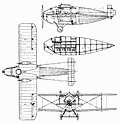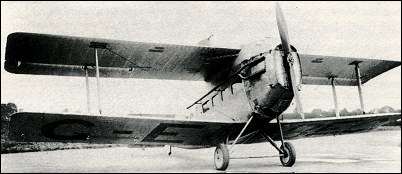|
| In early 1921 design was initiated of the Vickers Vulcan transport, a biplane of 14.94m span with a deep oval-section fuselage completely filling the space between the equal-span wings. It accommodated the pilot in an open cockpit forward of the upper wing, with below and behind him a roomy enclosed cabin for six to eight passengers. To limit selling price to the minimum, the low-cost war-surplus 268kW Rolls-Royce Eagle VIII engine was installed in the first six aircraft (Type 61) to be completed, but as a number of performance problems were encountered the last two examples (Type 74) had the 336kW Napier Lion. One of the early production aircraft was completed as a cargo carrier (Type 63) for Air Ministry evaluation, but was subsequently reconverted as a passenger carrier and used with one other Eagle-powered and the two Napier Lion-powered aircraft by Imperial Airways on European service. Their very limited reliability meant the Vulcan had a short useful life, only one or two surviving in service beyond the mid-1920s.
 | A three-view drawing (800 x 829) |
| MODEL | Type 74 |
| PASSENGERS | 6-8 |
| ENGINE | 1 x Napier Lion, 336kW |
| WEIGHTS |
| Take-off weight | 3062 kg | 6751 lb |
| DIMENSIONS |
| Wingspan | 14.94 m | 49 ft 0 in |
| PERFORMANCE |
| Max. speed | 180 km/h | 112 mph |
| baiwang, 21.06.2011 06:07 only one or two surviving in service beyond the mid-1920s. reply | | Joey, 28.09.2007 13:12 The World's Ugliest Aeroplane. Ever. I love it! reply |
|
Do you have any comments?
|
| 
COMPANY
PROFILE
All the World's Rotorcraft
|







